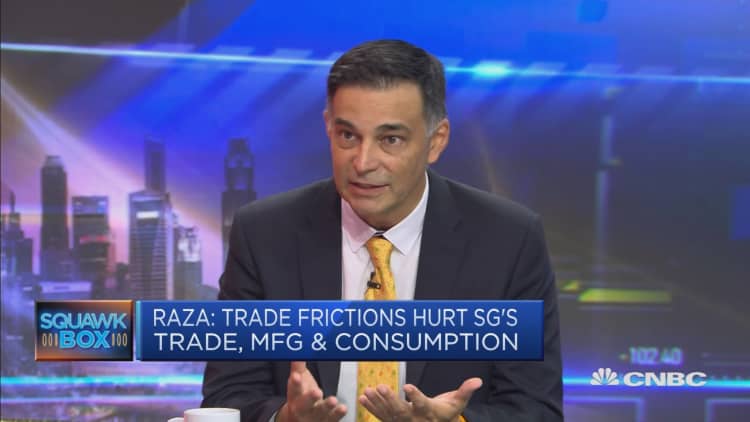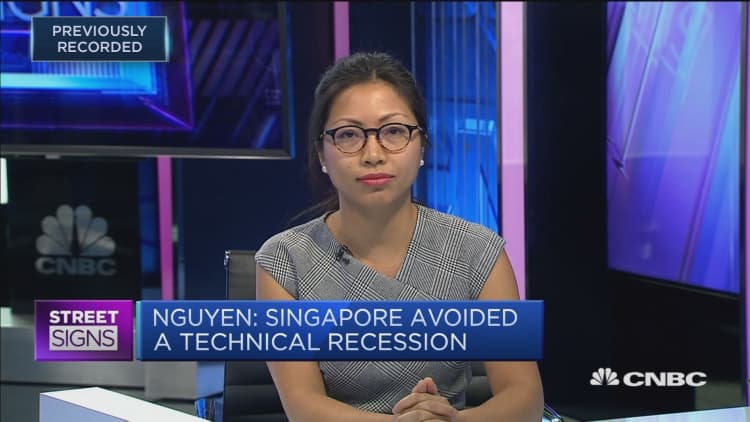
Singapore's economy — often seen as a bellwether for global growth — avoided a technical recession after growing by 0.6% in the third quarter, compared to the previous three months.
That quarter-on-quarter expansion marked a reversal from the revised 2.7% decline in the April-to-June period, official advance estimates by the Ministry of Trade and Industry showed on Monday. On a year-on-year basis, Singapore's economy grew 0.1% in the third quarter.
But the latest growth figures were below expectations. Economists polled by Reuters had expected Singapore's gross domestic product from July to September to increase by 1.5% quarter-on-quarter and 0.3% year-on-year.
A technical recession happens when there are two consecutive quarters of economic contraction. Talks of a global recession heightened in recent months amid a U.S.-China trade war that's dragged on for more than a year.
I don't think we're out of the woods. I'm still concerned there's a broad global slowdown and that places like Singapore don't seem to be coming out of it as of now.Anthony RazaUOB Asset Management
Singapore, a tiny country in Southeast Asia, has one of the highest trade-to-GDP ratios in the world. That makes its economy highly sensitive to global trade flows and business cycles.
SOURCE: Singapore's Ministry of Trade and Industry
In many economies where manufacturing and trading activities have moderated amid the U.S.-China trade war, consumer spending has held up. But in Singapore, both goods-producing and services-producing industries have been hit.
"The global slowdown is affecting Singapore in all areas," Anthony Raza, head of multi-asset strategy at UOB Asset Management, told CNBC's "Squawk Box Asia" on Monday.
"I don't think we're out of the woods. I'm still concerned there's a broad global slowdown and that places like Singapore don't seem to be coming out of it as of now," he added.
Central bank easing
In a separate announcement on Monday, Singapore's central bank said eased monetary policy by reducing the slope of the Singapore dollar policy band — referred to as the Singapore dollar nominal effective exchange rate, or S$NEER.
The Monetary Authority of Singapore adjusts monetary policy by managing the exchange rate of the Singapore dollar against a basket of currencies of its major trading partners. The policy band's slope, width and center, as well as the currencies that the Singapore dollar is measured against, are not disclosed.
The central bank announced Monday there's no change to the width and center of the Singapore dollar's trading band. That means the central bank has moderated the pace at which the local currency would appreciate against the basket of currencies.

The MAS warned that global growth "is expected to slow discernibly in 2019 compared to the previous two years" before stabilizing next year. That means some weakness in the Singaporean economy is likely to persist, especially in electronics manufacturing, the central bank said. Meanwhile, certain domestic-oriented sectors such as education, health and social services should stay resilient, it added.
Singapore's GDP growth is projected to come in "at around the mid-point" of the official 0-1% forecast range, the MAS said.
Trinh Nguyen, senior economist at Natixis, said Singapore may have to do more than ease monetary policy to support its economy.
"Help will need to come from elsewhere as well," she told CNBC's "Street Signs Asia" on Monday. She added that Singapore could explore other sources of growth, such as loosening its immigration policies and diversify its services sector away from trade.
"Singapore will need to be more nimble than before. It cannot grow as easily from trade ... so the question is how is it going to escape this?" she asked.


